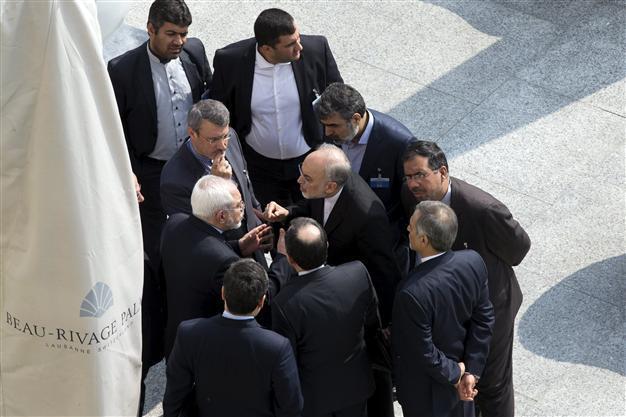Kerry, Zarif see progress in 'tough' Iran nuclear talks
LAUSANNE - Agence France-Presse

Iran's Foreign Minister Mohammad Javad Zarif (C on left) and head of the Atomic Energy Organization of Iran Ali Akbar Salehi (C on right) talk outside with aides after a morning negotiation session with U.S. Secretary of State John Kerry over Iran's nuclear programme in Lausanne March 19, 2015. REUTERS Photo
US Secretary of State John Kerry and his Iranian counterpart reported "progress" in talks on Tehran's contested nuclear programme but with still much left to achieve ahead of an March 31 deadline.
"We're pushing some tough issues, but we made progress," Kerry told reporters in the Swiss city of Lausanne during a break from talks involving Iranian Foreign Minister Mohammad Javad Zarif that are lasting all week.
"We are advancing very well but there's still a lot of work to be done," Zarif told Iran's state news agency IRNA.
A European diplomat involved in the negotiations said that Iran and six major powers -- the US, China, Russia, Britain, France and Germany -- remained "pretty far" from a deal.
"I think we are pretty far from a deal," the negotiator said. "The Iranians go back, go forward, it changes every day."
He also said that he did not expect a breakthrough by Friday, the tentative scheduled end of the talks, meaning that negotiators will likely have to return next week.
That chimed with Iran's foreign minister who said on Wednesday that the arrival of other foreign ministers -- which might suggest a deal is at hand -- was not expected this week.
"When the solutions are found and we approach a deal, then all the foreign ministers of the negotiating parties should come," Zarif told state media from Lausanne.
"I don't think their presence will be needed in this round," he said.
Iran's nuclear chief Ali Akbar Salehi, also present along with US Energy Secretary Ernest Moniz, said however late Wednesday that this was still not certain.
"We don't know yet, we still have two days to go," he told reporters.
The mooted agreement, due to be finalised by July, is aimed at convincing the world after a standoff now in its 13th year that Iran won't build nuclear weapons under the guise of its civilian programme.
The highly complex deal would likely involve Iran reducing in scope its nuclear activities, allowing ultra-tight inspections, exporting abroad nuclear material and halting development of new nuclear machinery.
In exchange Iran would be granted staggered relief from the mountain of painful sanctions that have strangled its oil exports and hammered its economy.
But Tehran, which denies wanting nuclear weapons, wants to expand its activities in order to fuel nuclear power stations and meet its energy needs.
On Tuesday the White House said the chances of such a deal are 50/50 "at best" with "some of the most difficult issues... yet to be resolved."
Negotiators missed two deadlines last July and November to clinch a deal despite numerous rounds of talks around the world.
Kerry cannot afford a new extension, however, experts say, with President Barack Obama's Republican opponents teeing up new sanctions legislation that would likely kill the entire process.
The Republicans and Israel's freshly re-elected Prime Minister Benjamin Netanyahu -- whose country is widely assumed to have nukes itself -- fear the agreement will not stop Iran getting the bomb.
"The sooner Obama can bring back an agreement that meets US policy goals, the better," Arms Control Association analyst Kelsey Davenport told AFP.
